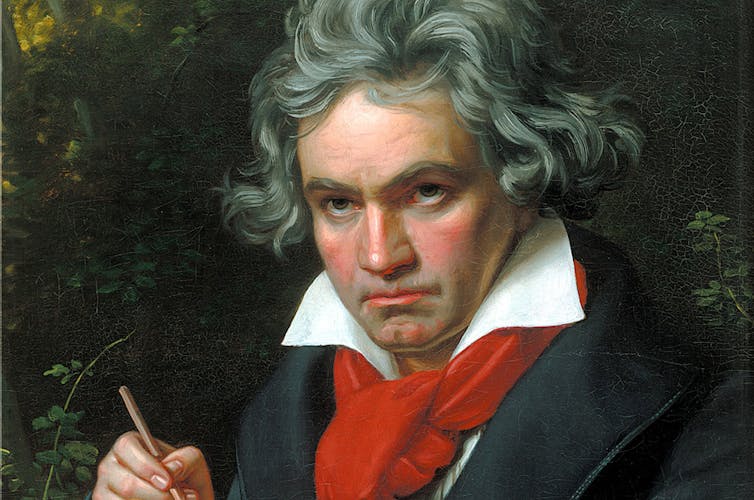San Francisco Symphony mixes things up with imagery and motion in “Missa Solemnis”
With mixed results, the San Francisco Symphony performed Beethoven’s “Missa Solemnis,” using projected imagery and movement on June 11th [2015] at Davies Symphony Hall. It would be easy to say that this masterpiece by Beethoven doesn’t need visuals in the background and motion in the foreground by the soloists and other singers. The music of this monumental oratorio has stood on its own musical merits. Yet the experimental nature of the performance by the SFS under Michael Tilson Thomas was well worth the effort, and, who knows, perhaps concert goers of the future will expect this kind of enhanced, operatic production.

Beethoven wrote the “Missa Solemnis” over four years from 1819 to 1823. By that point, he had already been composing works for 35 years, and he was also at work on his Ninth Symphony. With the “Missa Solemnis,” he created a deeply religious piece, based on the traditional Roman Catholic Mass, which would celebrate the investiture of Archduke Rudolph, his patron and sometime pupil. The performance by the SFS featured four stellar soloists, and the San Francisco Symphony Chorus augmented by the Pacific Boychoir. The score does not call for a chorus of boy, but the SFS and MTT felt that it would add an extra dimension to the concert. But the performance also included the soloist moving in and out of the stage area and evocative video projections. The motion and imagery gave the production an operatic feel, but I was not convinced that it enhanced the music all that much. More on that later.

The San Francisco Symphony Chorus, wonderfully prepared by Ragnar Bohlin, showed terrific resiliency with the many sforzandos and fortissimos. But the soprano section, which constantly soared up to stratospheric heights, was the star of the evening. Even when the music was at its loudest (which was quite often), the sopranos’ sound was right in the center of the note and never shrill.

The soloists, who had impressively memorized all of their passages, were superb in every respect. Joélle Harvey’s sumptuous soprano resonated beautifully. Sasha Cooke put lots of power behind her lovely mezzo tone. Tenor Brandon Jovanovich sang marvelously and with conviction. Shenyang added gravitas with his resonant bass-baritone. Perhaps, in the end, Cooke gave the most remarkable performance because she held nothing back and sang wonderfully again the next night in San Francisco Opera’s production of “Les Troyens.”

The orchestra, guided by MTT, played with great agility and sensitivity. Sudden decrescendos were as powerfully dramatic as the surging crescendos. Concertmaster Alexander Barantschik played his lyric solo during the “Benedictus” eloquently and with glowing, but he seemed especially stoic, standing with the soloists in front of the choir while playing the solo. At one point, Jovanovich quietly turned the page of his score for him. Another impressive element of this concert was watching MTT as he mouthed the words along with the singers. He was totally immersed in the music.

The projections, created by video designer Finn Ross, were arresting. Except for a golden flash of light at the beginning, almost all of the imagery was in black and white and variants of silvery grey. Letters exploded across the screen. Sometimes they dissolved and then reformulated. Sometimes words from the text drifted by and then formed an outline of a cathedral and the columns of its nave. During the credo, images of Christ and his story, appeared. Yet when the resurrection began to unfold, Ross missed an opportunity to transition the imagery into color. Instead everything remained in black and white until the end.

The stage directions of James Darrah mostly amounted to a distraction. The soloists walked slowly in and out of the stage area. After they exited one direction, sometimes they entered from another. It became sort of a guessing game rather than a way to understand the music. A couple of times the boy choir rushed in from the side wings, and that added some visual spunk and energy, but that wasn’t really needed since the music has so much of already. The strangest thing for them was the final tableau in which small groups of boys sat in campfire circle formation in front of the adult choir. It seemed that they could have at least sung the final bars of the “dona nobis pacem” with everyone else. On the plus side, everything was wonderfully accented by lighting designer David Finn.

I liked the idea of creating this new type of performance experience. Perhaps with less movement, it would have worked better. Musically speaking, Beethoven’s plea for mercy, peace, and understanding came through loud and clear. Amen.
All photos by Stefan Cohen
TO FOLLOW WHAT'S NEW ON FACTS & ARTS, PLEASE CLICK HERE!




















